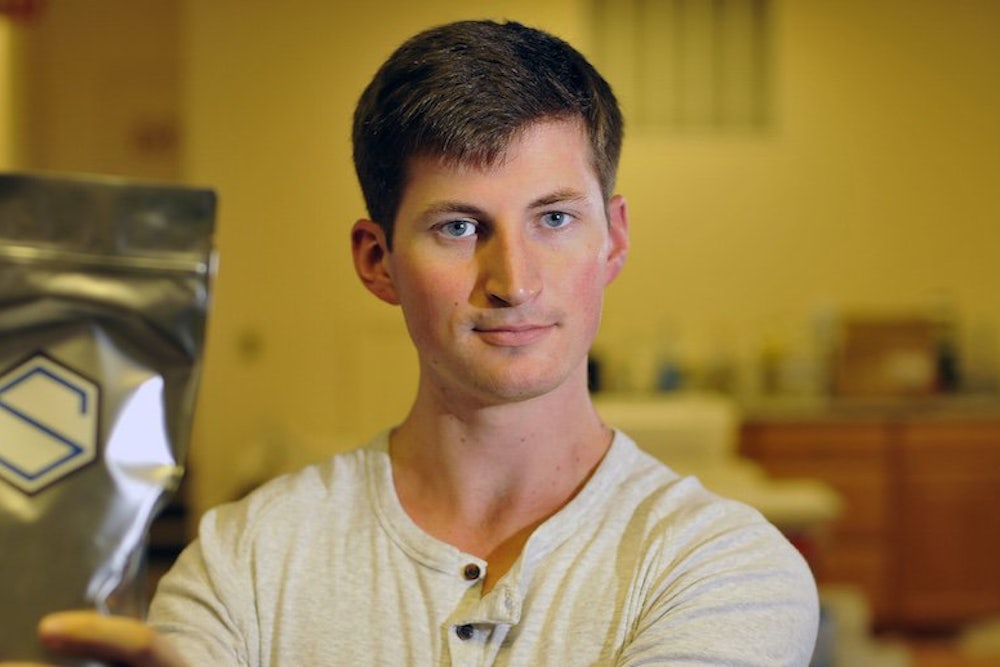Soylent—a pale, powdery drink that is meant to satisfy all of a person’s nutritional needs—is perhaps the perfect symbol of the Silicon Valley mentality: efficient, soulless, and naïve. Of late, it’s been a lightning rod for criticizing “solutionism,” that term coined by tech critic Evgeny Mozorov to connote the tech industry’s habit of finding a technological answer to every question, even the unasked ones. Soylent seems to starkly reject the recent, almost religious fervor around food and gourmet culture—particularly its turn to the artisanal and the organic. If you have the slightest feeling that solutionism robs us of our sensual connection to the world, Soylent and its robotic creator, Rob Rhinehart1, are the perfect symbols to prove the sentiment true.
It is easy to gently mock Rhinehart’s idealistic, odd proselytizing, and, in turn, Valley culture itself. Soylent and other solutionist ideas are hyper-efficient in ethos, but also joyless and self-righteous in their asceticism. Yet the scorn laid upon both Soylent and Silicon Valley in particular might better be aimed at those creating the products, rather than the actual products themselves.
It is important to keep in mind that there is a disparity between the rhetoric of certain, powerful actors—Rhinehart included—and how their ideas are eventually implemented. Consider: Soylent isn’t actually that bad. When you divorce the product from the ideology of its creator, what you end up with is actually something rather useful and benign—a relatively cheap, durable, and increasingly sustainable source of nutrition for those times that a leisurely al fresco meal with a crisp Riesling just isn’t feasible.
If it were Rhinehart alone hawking an odd product, a crackpot technological voice crying out in the wilderness, that would be one thing. Unfortunately, he isn’t alone in speaking and acting in a manner that reveals a fundamental shakiness in his grasp of ethical and existential concerns: such obliviousness is endemic to the tech industry.
Both Google’s Eric Schmidt and Facebook’s Mark Zuckerberg have made numerous eyebrow-raising comments about privacy—as if it is a hindrance to the openness of the web, or merely an outmoded fashion. Uber has both run roughshod over regulation, and told its drivers to avoid legitimate protest in China or face reprisal. Peter Thiel, an early backer of Facebook, pays college students to drop out, and has even floated the idea of a grand, libertarian island as a way of skirting regulation. And perhaps no single figure better encapsulates the free-market dogmatism in the Valley than venture capitalist Marc Andresseen, who, in his infamous “tweet storms” on Twitter, has no end of morally dubious ideas. Among his suggestions: that AirBnB reduces income inequality, or that innovative technology disproportionately helps the poor. (It does not, and it does not, respectively.)
Their ethos is off-putting at best—and at worst, it seems to imply that the most pernicious old ideas will be replicated, forever, into the future. Minor concerns like gustatory pleasure, privacy, or social justice have no place in the Valley's visions of an unregulated, Randian dystopia.
Thankfully, there is no way (yet) for Soylent to reconfigure global food supply chains—or, more simply, our human love of food. Rob Rhinehart isn’t going to break into your kitchen and rip your garlic scape pesto from your fists and force you to drink Soylent 2.0. He simply doesn’t have that power.
How technology, capital, and power work to change history, however, is messy. As mobile analyst Benedict Evans is fond of saying, who looked at the Ford Model T and predicted Walmart? I certainly did not. (Likewise: Will Soylent ever be sold at Walmart? Only time will tell.) The manner in which new technologies restructure relations of power, politics, and society is unpredictable, non-linear. History is a product of competing interests—and one of those interests, these days, is ethical, farm-to-table, organic, meaty, carb-filled oral pleasure. In other words: There are legions of people entirely opposed to Soylent, who aren't about to give up their dry-aged striploin or vegan smoothies.
Where technology criticism should focus its emphasis, therefore, is upon those pressure points where those like Thiel, Zuckerberg, or Schmidt can use their influence and significant capital to corrupt the public good, dictate social norms, or enact regulation that benefits a privileged few or exacerbates existing inequality. A concrete example: What is worthy of worry and criticism is whether Uber replaces public transit in cities with already struggling systems. What’s decidedly less important: Whether people choose to have Soylent for lunch.
The trouble is that the Valley's discourse is so both so hyperbolic and tone deaf that we end up conflating the innocuous with the genuinely worrying. We live in a time when the useful dimensions of digital, mobile, physical innovations are undercut by the rhetoric and ideology of their creators and boosters. Perhaps it is time to ask what a social network, crowdfunding app, or ridesharing service might look like if it weren’t backed by libertarians seemingly hellbent on becoming cartoon villains.
And maybe, when it comes to technology that affects those material aspects of being human—touch, privacy, our enjoyment of food, etc.—we can be more human in our technological assessments. Or, at the very least, chat with its creators over glasses of cold, nutrition-filled (and refreshing!) Soylent.
In a recent blog post, Rhinehart extolled the virtues of his hyper-efficient life; it begins with him feeling the pulsing electricity in the walls using the magnets he’s embedded in his fingers, and goes on to valorize many of its aspects, in part because—and I quote—“power will be at a premium in our first space colonies.”
